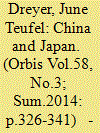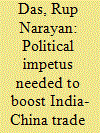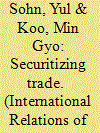| Srl | Item |
| 1 |
ID:
132552


|
|
|
|
|
| Publication |
2014.
|
| Summary/Abstract |
According to integration theory, growing economic interdependence between China and Japan should have spilled over into more cordial political relations. The opposite occurred, as summarized in the phrase "hot economics, cold politics." Even as both sides acknowledge the value of cooperation for shared benefit, commercial and strategic rivalries have intensified, calling into question the validity of integration theory.
|
|
|
|
|
|
|
|
|
|
|
|
|
|
|
|
| 2 |
ID:
116026


|
|
|
| 3 |
ID:
113391


|
|
|
| 4 |
ID:
144010


|
|
|
|
|
| Summary/Abstract |
In the narrative of the dynamic and yet complex Sino-Indian relations, bilateral economic relations between the two countries occupy a very critical space. With a combined population of 2.5 billion, China and India are the two most populous countries in the world constituting about 38% of world population. Together they account for one- tenth of gross domestic product of the world.
|
|
|
|
|
|
|
|
|
|
|
|
|
|
|
|
| 5 |
ID:
106464


|
|
|
|
|
| Publication |
2011.
|
| Summary/Abstract |
The Korea-US free trade agreement (KORUS FTA) of 2007 clearly shows how countries simultaneously pursue economic benefits and strategic interests in trade negotiations. This study argues that the surprise launch and the successful conclusion of the KORUS FTA illustrate the joint efforts by the United States and the Republic of Korea to re-securitize their bilateral economic relations. Security and strategic calculations held by top policy-makers on both sides catalyzed the official launch of FTA negotiations by removing a number of longstanding trade irritants such as Korea's screen quotas and ban on US beefs. At the post-negotiation stage, however, the lack of bipartisanship-particularly in the United States-to provide trade liberalization for their allies in favor of their own broader strategic interests has led to the legislative stalemate of executive efforts at re-securitization of trade relations. This study concludes that the stalemated ratification process shows the erosion, not the strength, of US power to provide security and trade liberalization as public goods.
|
|
|
|
|
|
|
|
|
|
|
|
|
|
|
|